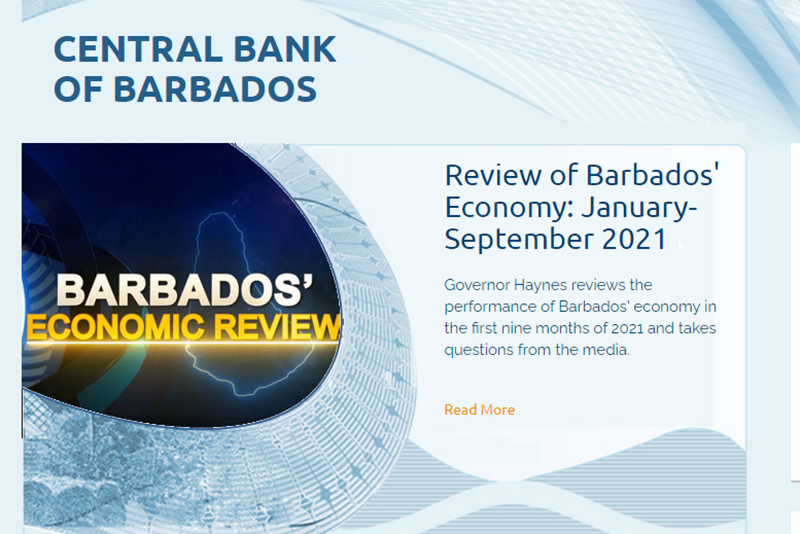Five Takeaways from the 2020 Financial Stability Report
| Author(s): | Central Bank Of Barbados |
Created 01 Oct, 2021 CBB BlogFinancial Stability Report
CBB BlogFinancial Stability Report General Press Release
General Press Release
Views: 841
Print
Share
ShareFacebookTwitterLinkedInEmail
Do you have an account at a bank, credit union, or finance and trust company? Do you have insurance for your car, house, or yourself? Do you have a pension plan? Do you have mutual funds? If the answer to any of those questions is yes, then the findings of the 2020 Financial Stability Report matter to you.
That’s because the report, which is produced jointly by the Central Bank of Barbados and the Financial Services Commission (FSC), Barbados’ two main financial regulators, examines the health of the major players in the island’s financial system: commercial banks, credit unions, insurance companies, deposit-taking finance and trust companies, pension funds, and mutual funds. This makes the Financial Stability Report a worthwhile read for anyone who wants to know how the institutions they have money with are performing. But to make it easy for you, here are five key takeaways from the 2020 edition.
Barbados’ Financial System Remains Stable…
There’s no question that the COVID-19 pandemic has had a severe impact at both the national and individual level, with economic activity slowing down, some businesses struggling to remain open, and many people losing their jobs or working reduced hours. This affects financial institutions, as their clients are among those people and businesses experiencing hardship and in some instances being unable to repay their loans on time.
Despite this, the report reveals that Barbados’ financial system has been able to weather the storm:
“The effects of the virus on households and businesses elevated financial sector risks. However, given the pre-COVID strength of financial institutions and the regulatory support provided by the Central Bank and the Financial Services Commission, the system remains stable.”
…And Can Withstand Further Shocks
In addition to analysing how the players in the financial sector performed in 2020, the report also conducted stress tests – simulations that measure financial institutions’ ability to withstand specific adverse events – on different sub-sectors to identify any weaknesses.
For commercial banks, credit unions, and finance and trust companies, stress tests examined what would happen if there was a significant increase in loans not being repaid for 90 days or more, what are referred to as non-performing loans (NPLs). They were also done to determine what would happen if there was a run on deposits – if a large number of customers withdrew their money at the same time. In each scenario, all three subsectors were able to withstand the shock until the situation became extreme. As an example, the commercial banking sector could withstand a 200 percent increase in NPLs.
For insurance companies, the report tested what would happen if there was a severe economic downturn. The findings showed that the sector would remain solvent.
It’s worth noting, however, that while stress tests indicate that the various subsectors as a whole are resilient, at an individual level, some entities are stronger than others. As such, the report notes that the Central Bank and the FSC will continue to monitor individual institutions as well.
The Local Financial System is Very Interconnected
Also worthy of note in the report is the extent to which the different players in Barbados’ financial system are connected.
Here’s why that matters. You might think that if you don’t have money saved at a commercial bank, for example, that what happens in that subsector does not affect you, but credit unions, insurance companies, and other types of financial institutions all have either deposits or loans with commercial banks, so they will all be affected if there is a major problem in the commercial banking sector.
The report indicates that most classes of institutions except credit unions reduced their exposure to commercial banks in 2020, but they still have “substantial assets in the banking system.” During the same period, insurance companies and credit unions increased their deposits with finance and trust companies.
Barbados’ Payments System is Evolving…
The 2020 Financial Stability Report also offers a look at Barbados’ payments system, including a brief overview of the new Barbados National Payment System Act, which was passed in February 2021. The report notes that “it is hoped that the new framework will boost innovation in the payments space by encouraging the increased use of various forms of electronic payments in Barbados.”
It also touches on the phasing out of CarIFS and introduction of the VISA and Mastercard platforms for debit card services, the upgrading of the automated clearing house (ACH), which would facilitate more real-time payments, and other initiatives intended to both encourage and facilitate more electronic and digital payment options.
…But Cash Will Remain an Important Part of the Mix
At the same time, the report shows that even with several alternative payment methods already available, cash remains popular.
Debit card and credit card use both fell in 2020. Debit card transactions decreased by $100 million, while credit card transactions were down by $93 million, in both cases likely due in large part to the national shutdown and to people being laid off and so having less money to spend.
Interestingly, the value of cash in circulation increased by $60 million during the year despite a push towards contactless payments early in the pandemic. The report attributes it to “increased cash holdings of financial institutions to meet liquidity needs and to service the higher demand for cash by customers during the pandemic.” While Barbadians like and want a variety of payment options, cash continues to be widely used for domestic transactions.
By now it should be clear that the 2020 Financial Stability Report is an incredibly useful publication, and the five takeaways we’ve mentioned are just a taste of the information that can be found in it. So anyone who saves or spends money – and that’s all of us – should give it a read.

The Central Bank of Barbados (CBB) is the national monetary authority responsible for providing advice to the Government of Barbados on banking and other financial and monetary matters. The Central Bank of Barbados, was established by Act of parliament on 2 May 1972. Prior to the establishment of CBB, Barbados’ monetary policies were governed through its membership in the Eastern Caribbean Currency Authority (ECC…Wikipedia · Text under CC-BY-SA license




